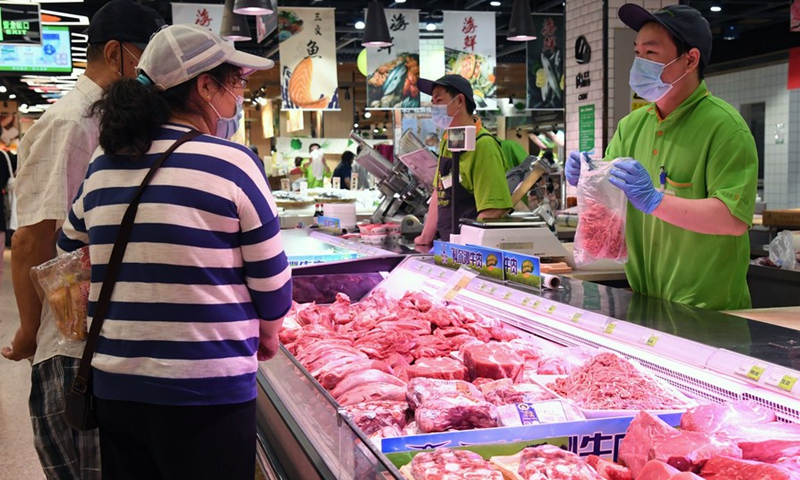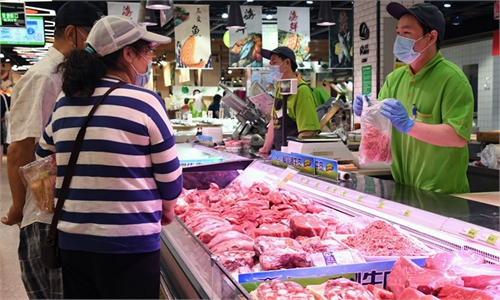China suspends imports from meat processors in Brazil, Argentina, Germany, Canada and the Netherlands over coronavirus concerns

Customers buy meat at a Chaoshifa supermarket branch in Haidian District of Beijing, capital of China, June 14, 2020. (Xinhua/Ren Chao)
China customs said on Thursday that several meat processors in Brazil, Argentina, Germany, Canada and the Netherlands have suspended exports to China since late June, a move which industry insiders said represents part of Beijing's strengthened measures on frozen imports as more cluster infection cases emerged in food processing factories overseas.
Brazilian poultry exporter Jbs Aves Ltda voluntarily halted exports to China on June 26, according to a statement on the website of the General Administration of Customs.
In addition, a beef exporter based in Argentina voluntarily suspended exports to China on June 22.
Chinese customs has also halted several import applications from overseas meat processors since June 27, including German pork exporter Danisch Crown Fleisch GmbH, two Brazilian beef and poultry exporters, a Canadian beef exporter and four pork enterprises based in the Netherlands.
Chinese industry insiders said that the suspension involving those companies is an important message that local authorities are tightening quality requirements for all imported meat, on heels of the latest coronavirus outbreak in a wholesale food market in Beijing.
Jiao Shanwei, editor-in-chief of cngrain.com, a website specializing in grain news, told the Global Times on Thursday that the suspension will have a limited impact on the domestic meat supply market, as live pig supply is abundant in China and there is even a glut in poultry products.
"If the coronavirus ebbs overseas, China will ramp up efforts to expand meat imports in the fourth quarter," Jiao said.
China imported about 6.18 million tons of meat last year, mainly from Brazil, European countries such as Spain and Germany, and the US, according to the China Meat Association (CMA).
In early June in Brazil, an estimated 2,399 employees from 24 slaughterhouses in 18 municipalities of Brazil's southernmost state of Rio Grande do Sul have been infected. Previously in the Netherlands, 147 people were diagnosed with the coronavirus at a Dutch pork processing plant near the German border, according to Reuters.
On June 23, UK and Brazilian authorities informed China Customs that two companies - UK-based pork provider Tulip and Brazil's beef supplier Agra - had reported the suspension of all exports to China due to positive COVID-19 cases among their employees.
China suspended imports from Tyson Foods, one of the largest meat producers in the US, on June 21 over cluster cases of COVID-19 at its factory.



